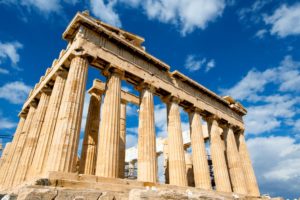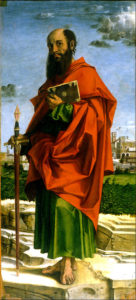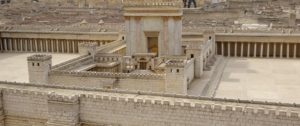WHO WAS ST PAUL?
Paul was a Jewish rabbi who wrote over 20% of the New Testament, indeed some of the most important parts of it, and appears in another 8%. Almost a third of it! But in general people know almost nothing about him. So who was this mystery man?
His name
We know him as Paul, but that was not his name originally. His name was Saul, called after the first king of Israel c. 1,000 B.C.E. But his name as spoken would have been Sha’ul – different because Greek did not have any way of writing the sound ‘sh”. He later was called Paul, a normal Latin name meaning ‘small’. He did not change his name when he became a follower of Jesus, but a few years later, when he was on a mission in Cyprus. Perhaps it was the name he used in non-Jewish society, a bit like someone from Africa or India living in Britain today and having one name in the family and another, simpler name in the outside world.
His early life
Sha’ul was brought up in the Greek-speaking city of Tarsus in modern south-east Turkey, a city known for its open-minded attitude and desire for novelty. His father must have been a leading citizen and he received the (then) rare honour of being made a Roman citizen. Sha’ul might have been a second son, hence the use of ‘Paulus’ the Latin name for little. The family was devout, and in his teens Sha’ul went to study the Jewish religion in Jerusalem under the renowned rabbi Gamaliel.
Attacking the new Jesus movement
In Jerusalem Sha’ul joined the Pharisee movement, people who took their faith with the greatest seriousness and who wanted to live ritually pure lives, just as if they were temple priests. “I can testify that they have a zeal for God, but it is not enlightened.” (Romans 10.2) He became a virulent opponent of the new Spirit-filled movement that exploded into life shortly after the death by crucifixion of their leader Jesus. When he was still a young man (about 20?) he supported the death by stoning of Stephen, the first Christian to die for his faith, looking after the coats of the executioners. He led teams arresting these new-fangled Christians in their homes, both men and women. He then persuaded the chief priests to give him letters of authority allowing him to arrest any “followers of the Way” he found in the synagogues of Damascus. (Acts 8.1-3, 9.1-2)
The Damascus moment
Sha’ul would have travelled for at least a week with his companions to reach Damascus, a distance of about 140 miles. They probably walked all the way – horses are not mentioned. When they were in sight of the city, a bright light shone/a voice spoke and Jesus himself said, “Sha’ul, Sha’ul, why do you persecute me?” He was told to carry on into the city, but he had become blind. After three days one of the Jesus followers he had been going to arrest came and prayed for him. His sight was restored, he received the Holy Spirit and was baptised into the name of Jesus. He then went away into the desert of Arabia to make sense of it all. He returned to Damascus and for three years he argued so powerfully in the synagogues that Jesus was the awaited Messiah that a group of Jews determined to murder him. He escaped by being let down the outside wall of the city after dark in a basket! (Acts 9.3-25, Galatians 1.15-18)
The silent years
Sha’ul went to Jerusalem and stayed with Simon Peter for two weeks. In Jerusalem he had two problems: the Christians distrusted him; and the Greek-speaking Jews wanted to kill him. So he was sent off by ship back to Tarsus. Meanwhile a new community was established in Antioch, a major city of half a million souls and a main centre of Diaspora Judaism. There both Jews and Gentiles turned to Christ and the apostles sent Barnabas, (“a good man, full of the Holy Spirit and of faith”), to pastor them. He saw that they needed someone who could argue the Christian case powerfully, so he journeyed to Tarsus, found Sha’ul eventually, and brought him back to help lead the new and growing church in Antioch. (Acts 9.26-30, 11.22-26)
The years of travel
During a worship time in Antioch, people heard the Holy Spirit say that God had a special task for Sha’ul and Barnabas, so they went travelling and preaching: to Cyprus, (from here on Sha’ul was known as Paulos), modern Turkey, then back to Antioch. They then visited Jerusalem to decide how Gentile believers should fit into the new Community. “After some days” Paul went back to visit the churches in Asia Minor, without Barnabas because they had quarrelled. The journey extended to Ephesus and to Greece as far as Corinth. Paul then undertook a large collection of money from the churches in Asia Minor and Greece to support the Christian community in Jerusalem. He took it himself, even though he knew it was risky:”Pray that I may be rescued from the unbelievers in Judea, and that my ministry to Jerusalem may be acceptable to the saints.” (Romans 15.31) In fact the visit ended up with his being arrested and spending several years in prison in Palestine, before being transferred to Rome, and almost perishing in a shipwreck.
say that God had a special task for Sha’ul and Barnabas, so they went travelling and preaching: to Cyprus, (from here on Sha’ul was known as Paulos), modern Turkey, then back to Antioch. They then visited Jerusalem to decide how Gentile believers should fit into the new Community. “After some days” Paul went back to visit the churches in Asia Minor, without Barnabas because they had quarrelled. The journey extended to Ephesus and to Greece as far as Corinth. Paul then undertook a large collection of money from the churches in Asia Minor and Greece to support the Christian community in Jerusalem. He took it himself, even though he knew it was risky:”Pray that I may be rescued from the unbelievers in Judea, and that my ministry to Jerusalem may be acceptable to the saints.” (Romans 15.31) In fact the visit ended up with his being arrested and spending several years in prison in Palestine, before being transferred to Rome, and almost perishing in a shipwreck.
 This is how he describes his life as a missionary: “Five times I have received from the Jews the forty lashes minus one. Three times I was beaten with rods. Once I received a stoning. Three times I was shipwrecked; for a night and a day I was adrift at sea; on frequent journeys, in danger from rivers, danger from bandits, danger from my own people, danger from Gentiles, danger in the city, danger in the wilderness, danger at sea, danger from false brothers and sisters; in toil and hardship, through many a sleepless night, hungry and thirsty, often without food, cold and naked. And, besides other things, I am under daily pressure because of my anxiety for all the churches.” (2 Corinthians 11.24-28)
This is how he describes his life as a missionary: “Five times I have received from the Jews the forty lashes minus one. Three times I was beaten with rods. Once I received a stoning. Three times I was shipwrecked; for a night and a day I was adrift at sea; on frequent journeys, in danger from rivers, danger from bandits, danger from my own people, danger from Gentiles, danger in the city, danger in the wilderness, danger at sea, danger from false brothers and sisters; in toil and hardship, through many a sleepless night, hungry and thirsty, often without food, cold and naked. And, besides other things, I am under daily pressure because of my anxiety for all the churches.” (2 Corinthians 11.24-28)
The end of Paul’s life
Paul was held under house arrest in Rome between 60 and 62 A.D. He may have been released and made a missionary journey to Spain, as was his original intention. Or he may have continued under house arrest. Some time during the reign of Nero, d.68, he was beheaded. As he said in this time of total uncertainty: “It is my eager expectation and hope that I will not be put to shame in any way, but that by my speaking with all boldness, Christ will be exalted now as always in my body, whether by life or by death. For to me, to live is Christ and to die is gain.” (Philippians 1.20-21).Could we say the same?
Nero, d.68, he was beheaded. As he said in this time of total uncertainty: “It is my eager expectation and hope that I will not be put to shame in any way, but that by my speaking with all boldness, Christ will be exalted now as always in my body, whether by life or by death. For to me, to live is Christ and to die is gain.” (Philippians 1.20-21).Could we say the same?


